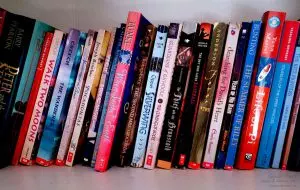How Reading Fiction Improves Social Skills And More
Most see book worms as socially inept. They use fiction as escape. Yet, studies show that reading fiction improves social skills. This brings many other benefits too.
The Research Behind Reading Fiction
For instance, consider Keith Oatley’s article, “In the Mind of Others,” which appeared in the November 2011 edition of Scientific American Mind. It reports on his work(1) sharing how reading fiction improves social skills:
. . . [it] facilitates the development of social skills because it provides experience thinking about other people.
Simply, reading fiction works the mind. In doing so, social skills, empathy and problem solving improve. In other work(2) Oatley says it “can even alter the reader’s sense of self.” The reader walks in the characters’ shoes.

Reading fiction improves social skills by placing the reader in the minds and hearts of others.
Velten Mood Induction
A similar effect occurs with the Velten Mood Induction . It involves changing people’s moods through the reading of different passages. While often used to test the effect of moods on thoughts and behaviors, it shows reading can alter the readers’ moods significantly.
In the context of a fiction, this has the reader experiencing the moods of a character or even a group of characters. This impacts skill development. Moreover, the diversity of emotions and moods experienced in one book could be far more than those experienced in everyday life.
Thus, the reader’s personality could alter in a way similar to actors playing their characters. Moreover, “the properties of fictional narrative invite identification with characters in ways that nonfiction usually does not.” In short, fiction has an emotional element that does not exist in non-fiction.
How Reading Fiction Improves Social Skills at Work
In business, we often have to imagine ourselves as others in planning. We run through scenarios. Even the military uses computer simulations to see how people respond emotionally. Seen in this light, why can’t fiction do the same? A good piece of fiction often has us seeing that the people could be real. A good what-if scenario or a computer simulation should too.
While the research focused on readers putting themselves in the minds of others, the emotional connection plays a key role too. Thus, fiction’s true value is in developing empathy. That not only allows us to relate better. It also makes us better predictors of human activity. This benefits business planning and many other aspects of business.
In sum, we become better influencers, leaders and problem solvers.
1Those who worked with Keith Oatley on the effects of reading fiction on social skills:
- Raymond A. Mar of York University
- Chris Moore of Dalhousie University
- Jennifer Tackett of University of Toronto
2Those who worked with Keith Oatley on the effects of reading fiction on personality:
- Jordan Peterson of University of Toronto
- Maja Djikic of University of Toronto
- Sara Zoeterman of University of Toronto



Hi Mike,
I totally concur with the notion that fiction can alter a person’s sense of self. This is no different than a therapist teaching a client to visualize a positive, desired situation. Your subconscious mind doesn’t know the difference between what is real and what is imagined. It reacts the same way.
Thanks for sharing!
Gregory
You’re right, Gregory, there is much about fiction that taps into our subconscious. Fiction has a habit of producing real emotions in us; witness all the people who get teary-eyed over or who get nightmares from movies. Thank you for visiting.
Hi Mike I think this is a great example of how another persons thoughts and views can be interpreted or understood through metaphor. For author he is sharing it from his or her perspective. However each reader will interpret it differently. I now see a whole new value to book clubs. It also gives me a great idea for continued development for my 14 year old son whom I home school. Perhaps taking a passage and drawing what we both interpret it to mean gives us both awareness for future communications and understanding
Yes, Sheryl, you are right about that. Additionally, you can make conclusions about their personalities. Yes, each reader will interpret it differently also giving you insights into the reader’s thoughts, views, personality, etc. I do believe you are onto something regarding your son and your communications and understandings with him. Thank you for visiting!